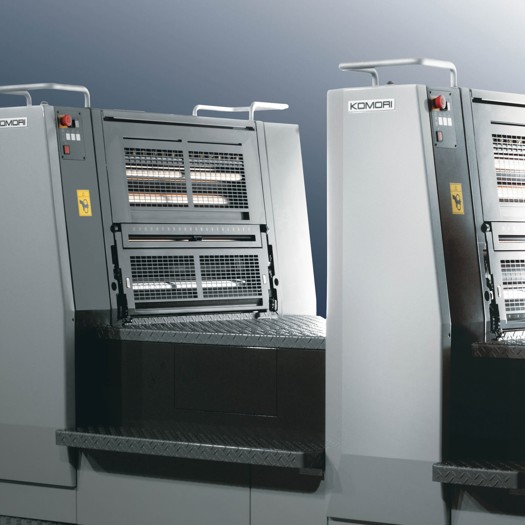The Liverpool-based high-end litho and digital commercial printer spent £1.3m on the five-colour Komori GL40 e-UV plus coater, which was installed with temperature control, water treatment and filtration systems from the Technotrans beta range.
Printfine managing director Peter Scott said: “The press was delivered in five articulated trucks and installed two months ago. It's pretty unique in the UK as it offers three technologies: UV, HUV and [conventional] hot air.
The press features Komori's e-UV system, which means it can run standard UV, H-UV or conventional inks and coatings. Printfine's press is the first Komori press of its type in the UK.
Komori UK director of sheetfed sales Steve Turner said that Printfine's wide-range of products was ideally suited to the e-UV configuration: "They really do produce the widest gamut of products you could imagine, and this press gives them complete flexibility and lots of options."
The new machine replaced a 20-year-old six-colour Komori LS 40 and joins a Komori LS 540 and an LS 240 perfector press.
“Makereadies take minutes and the press is very fast: 16,500sph. The UV and HUV, meanwhile, have opened doors: we had an existing client base that bought their UV work elsewhere.
“We work for quite a few high-quality agencies and the new kit will also enable us to print on to different substrates such as foil and plastic.”
As well as Komori B1 presses, the firm also runs two Xerox Versant machines.
Scott said the 42-staff company, which bills itself Liverpool's only B1 sheetfed printer, wanted to add £1m to its £4m turnover in 12 months following the press install.
Regarding the firm’s decision to opt for the beta ancillaries, he said: “Technotrans is the market leader so we were guided by Komori and went with them, knowing that the peripherals would enhance the quality of print and be an environmental advantage.
“We wanted to be green and to ensure production was stable. We need to know the founts, inks and temperature are consistent and the minimal maintenance is also an advantage.”
Technotrans said the beta.c circulator ensures temperature is controlled around the ink and dampening units. Filtration removes dust and debris and recycles chemistry, cutting consumables and waste bills.
Combined with the water treatment, which controls the pH and hardness of the water, it means good consistent dampening all the time.











